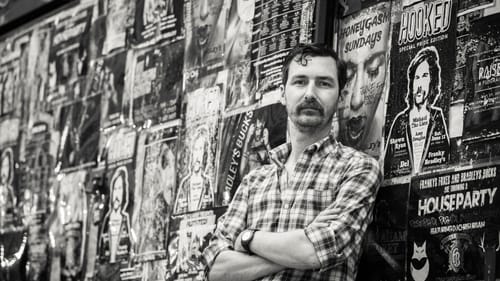Stay in the Loop
BSR publishes on a weekly schedule, with an email newsletter every Wednesday and Thursday morning. There’s no paywall, and subscribing is always free.
Diving into Philly's deep disco history with Michael the Lion

Philly-based DJ/Producer Michael Fichman (aka Michael the Lion) is a veteran and leading light in the city’s impossibly deep DJ culture. A gifted and knowledgeable musical auteur, Fichman currently holds down Hooked, a classic disco party here in Philly, and he tours the world with his Funk Train party, bringing soulful, uplifting sounds to the world. Eight years ago, he teamed up with powerhouse singer/songwriter Amy Douglas to record demos for another project. This initial collaboration was the start of a fruitful creative relationship. The duo’s latest project is a self-titled EP that is peppered with rich, uplifting songs like “Willing.” The refreshing anthem “Find a Way” is Fichman and Douglas’s contemporary take on disco that reminds us of timeless legacy; uplifting, danceable music to give us hope through some of our darkest times. BSR recently spoke with Fichman to discuss the project and how Philly’s amazing yet unheralded musical history inspired it.
John Morrison: For starters, could you talk a bit about the origins of the project? Why and how did you start putting this together?
Michael the Lion: This record is about eight years in the making. Amy Douglas sang a demo for an LP I was working on in 2012. That LP idea never came out, but those demos morphed into the Michael the Lion project, which was basically me blending live instruments and voice with samples to make classic-sounding disco. That demo with Amy turned into a 2014 vinyl single called Funk Train on Soul Clap Records. It was great, so she wrote and sang on my self-titled EP in 2017 on a song called "Get It On." And that got a lot of underground support, so around that time we decided to do a full EP together.
JM: Word. Listening to it and some of the MTL stuff you've done before, I have to say, you really nailed it when it comes to making contemporary but classic-sounding disco. A lot of these tunes sound like something that I would've heard on WDAS as a kid.
MTL: I have always loved to play that music in my DJ sets. I have a classic disco party called Hooked in Philly and one that I tour called Funk Train. But this record I played much of it with a studio band, which was an enormous challenge. In its day this was very complex music to record, and if it was like 95 percent of the way there but not 100 percent, it would have sounded totally wrong. By the way, the place where that classic Philly disco was recorded, Sigma Sound—there's a group who wants to save the site from demolition and turn it into a museum. People should support that movement!
JM: I'm definitely going to include that bit. We need to boost that Sigma message and preserve that building! Since you brought it up, could you talk a bit about Philly's legacy of disco and soul music? A lot of folks that live here aren't really aware of that history.
MTL: The Philly Sound was to the '70s what Motown was to the '60s in terms of popular soul music coming out of one city and community of studio musicians and writers. Disco got written off even in its day for being too Black or too gay, and it was not given its due until very recently because its influence really shows now. Philadelphia has a huge role in the origin of what became house and techno and the electronic sounds that are in the pop sensibility today. It either sampled Philly disco or was influenced by it. The beat Earl Young from the Trammps (Philly drummer and inventor of the Disco beat) and others created here is all over electronic music.

JM: Right! There's a video where Danny Tenaglia explicitly states that house music was born in Philadelphia through disco and Philly International. Now, I wouldn't say that or try to take anything away from Chicago, but the blueprint for that strain of uptempo dance music did come from here.
MTL: It went everywhere, that's the amazing thing. People in New York, Chicago, Detroit, Europe—they all took this music that we created and turned it into something of their own. It's something for the city to be enormously proud of. One thing Amy and I really draw from that period is having a message in the music. You can make records that people want to dance to that have some gravity to them.
JM: Right. I noticed that a lot of the music on the record strikes that mood nicely. Feel-good, uplifting, message-oriented tunes.
MTL: We all go through stuff in our lives, and Amy and I try to sing about it. It's therapeutic for us first and foremost. We've had this odd fortune of having these types of records come out in times of crisis. The first time we performed “Get It On” was the night of the Pulse Nightclub shooting. That record came out the week Trump was elected. Now we release an EP and a remix record in the midst of a combination of plague and depression. Through an odd set of circumstances maybe we're being put in a position to help somehow.
What, When, Where:
The self-titled EP from Michael the Lion and Amy Douglas is available for stream online.
Sign up for our newsletter
All of the week's new articles, all in one place. Sign up for the free weekly BSR newsletters, and don't miss a conversation.

 John Morrison
John Morrison